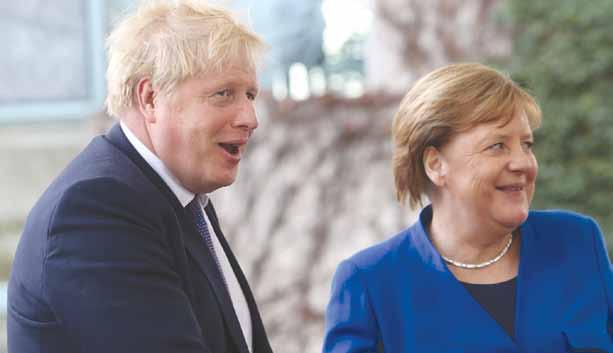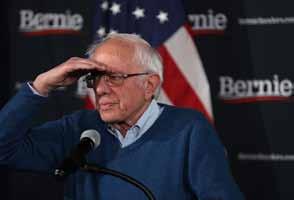
21 minute read
App Error Delays Results of Iowa Democratic Caucus

The first Democratic caucus took place in Iowa this week, as the Democrats are vying to pick their candidate who will take on Trump in November’s presidential election. However, a “coding error” in an app which was being used for the first time, caused a major delay in reporting the results. Three days later, only about 70 percent of the results have been disclosed. It was not a good week for Former Vice President Joe Biden, who was one of the front runners in the race, as the results showed him at fourth place, meanwhile Pete Buttigieg and Bernie Sanders were firmly in front, as the former has so far earned 26.2 percent of the vote, while the latter secured 26.1 percent.
Sudanese and Israeli Leader Meet in Uganda Abdul Fatah Burhan, the head of the transitional sovereign council in Sudan, met with Israeli Prime Minister Benjamin Netanyahu in Uganda this week. The meeting was unprecedented since both nations have been hostile towards each other, especially during the 30 years in which the Islamist Bashir regime was in power in Sudan. During the meeting, Burhan agreed to allow flights to and from Israel (except for those belonging to the Israeli El Al airline), while Israel would be allowed to use Khartoum’s airspace. The meeting was part of the transitional government’s attempts to remove Sudan from the US’s list of states that sponsor terror and happened one day after US Secretary of State Mike Pompeo invited Burhan to visit the US, the date for this meeting has not been announced as of yet.
Lebanon Cabinet Approves Financial Rescue Plan On Thursday Lebanon’s new government approved a rescue plan to pull the country from its worst economic and financial crisis in decades and it must now win a vote of confidence in parliament. A draft policy statement seen by Reuters on Sunday outlined broad plans, including reducing interest rates, recapitalizing banks, restructuring the public sector and seeking support from foreign donors. Prime Minister Hassan Diab urged European states to open a credit line and provide aid to rescue his country. Foreign donors have said they stand ready to support Lebanon only if it implements long-stalled reforms. The information minister said the cabinet approved the rescue plan on Thursday with some amendments, which ministerial sources said were minor. It was not immediately clear what changes were made to the 17-page statement, due to be presented on Tuesday in parliament for the new government to secure a vote of confidence. Diab’s cabinet was formed last month by the Iran-backed Hezbollah movement and its political allies, which hold a parliamentary majority.


Skids Off Runway737Pegasus Boeing in Istanbul Airport A Pegasus jet carrying 177 passengers and 6 crew members crash landed Sabiha Gokcen airport, causing three people to lose their lives. The plane crashed while it was about 30 to 40 meters above the ground and poor weather caused it to skid pass the runway. The accident has added more trouble to Boeing’s growing list of woes, as it is already facing scrutiny over a lack of adequate safety checks on its 737 Max which has been grounded in March 2019 after two fatal crashes happened within 5 months.
over story C

The Stillborn New Government of Lebanon
As the Financial Collapse Looms, the New Cabinet Will Face its Failure Sooner Than It Expects
Female ministers of the newly formed Lebanese government, Labor minister Lamia Yammine, Justice Minister MarieClaude Najm, Deputy Prime Minister and Defense Minister Zeina Akar, Youth and Sports Minister Vartini Ohanian, Information Minister Manal Abdel-Samad and Minister of Affairs for the Displaced Ghada Shreim pose for a photo after a new government formed in Beirut, Lebanon in January 2020 ,22. (Getty)
by Hanin Ghaddar
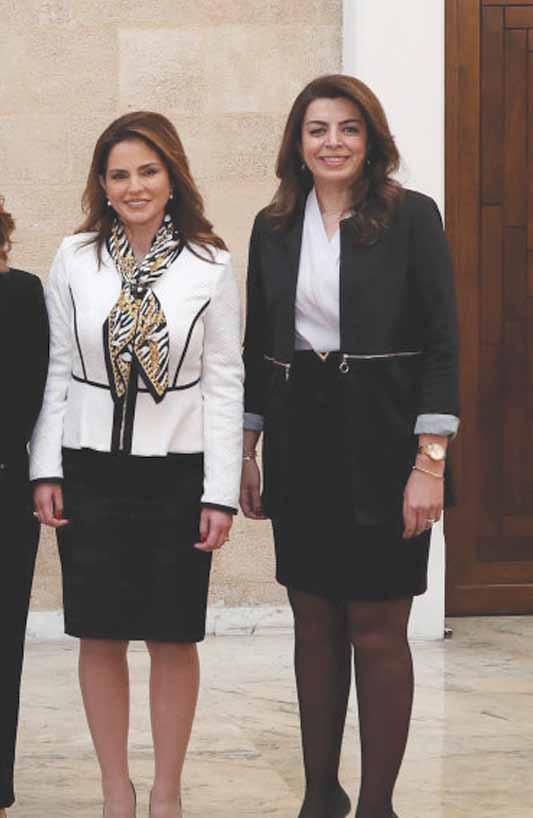
During the same week as Lebanon’s new cabinet finalized its Ministerial Statement, and made promises of reform and anti-corruption measures, most Lebanese banks slashed the monthly dollar withdrawal limit by %50, according to a number of media reports.
Three major banks contacted by AFP last week confirmed they have halved the dollar withdrawal limit since the beginning of February, some capping the amount at 600$ a month. The informal controls have sparked public outrage in protest-hit Lebanon, where an antigovernment street movement launched on October 17 has grown increasingly angry at banking policies.
The Lebanese people are worried that the new cabinet’s measures are going to target the poor and their bank savings, instead of the rich and political figures, in an attempt to slow down the economic collapse. No one really believes the promises made by the Central Bank, Commercial banks and political leaders, that depositors will not lose their money. The signs are not reassuring.
THE NEW GOVERNMENT’S MISSION
While all eyes are cast on the banks’ new policies and the deteriorating economic situation in Lebanon, the new government is trying to focus on two issues. First, protect Hezbollah and its allies’ political and financial interests. For example, the new ministerial statement talked about corruption generally, without moving forward with concrete steps on the electricity sector. That’s mainly because both Hezbollah and its ally Gebran Bassil are very much involved in this sector and any anti-corruption measures could cause them major financial loss.
This is also a government that was carefully tailored by Hezbollah, former Security General Director Jamil Assayed – known to be an Assad ally – and Bassil – who owns the blocking third of the cabinet. This is not a government that would threaten Hezbollah’s power, weapons or aces to state institutions. On the contrary, having rid itself from some of the few opponents, Hezbollah and its allies now have more access to the state and its resources, or whatever is left of them.
over story C
Lebanon will increase, as well as its cross border ones such as smuggling and military transfers. Hezbollah will also be able to bring in hard currency and goods from the region – mainly from Iran, Iraq and Syria - into Lebanon as some of the basic goods are in shortage. Second, this government will try to make a few superficial or selective reforms in order to fool the international community into bailing it out. As it stays away from the interests of Hezbollah and its allies, this government will target their opponents, mainly those who have been implicated in corruption deals. To cover its real intentions, the new government might resort to target one of its known allies with anti-corruption measures. This person could likely be Speaker Nabih Berri, knowing that both Bassil and Assayed have serious issues with him. Assayed wants to take his spot as the next Speaker of the House, and the BassilBerri relationship has always been sore.

For Hezbollah, Berri might have served his purpose and is no longer needed. The fact that he has been protected by Hezbollah for so long has actually back-fired on Hezbollah’s support-base, mainly due to the fact that Berri’s corruption has become too obvious and too painful to endure. The Shia street that has joined the Lebanon protests recently has focused on Berri’s corruption, and Hezbollah might benefit as well from throwing him into the pit. Lebanon’s new government will try to hide these complexities and play on the international community’s fear of instability. Again, they will sell the same formula of stability for the status co, while adding to it a few cosmetic reforms. That is why it is essential for the international
community to avoid bailing this government at all costs; otherwise, Hezbollah will win again . THE NEW GOVERNMENT’S CHALLENGES
There is a big difference between what the government plans to do and what it can actually and realistically do. The mission – outlined above - is quite clear, and will be accompanied by a campaign to crack down on the protestors in the street, to make sure they are no longer heard. If that fails, the plan is to destroy their credibility in the form of international public opinion, by turning the protests into violent ones, or at least create scenes of clashes between the protestors and the security forces.
12 10/01/20 Lebanese riot police forces block a road leading to the parliament during clashes with antigovernment protesters in downtown Beirut, on January 2020 ,22. (Getty)
verge of collapse before. As people lose their savings, their jobs and their dignity, the street will become the only place to express their anger. Second, the international community does prioritize stability in Lebanon; however, it has become clear that stability can no longer be tied to Hezbollah and Iran. The Gulf States – except for Qatar - have already made it clear that they will not bail out Lebanon with a Hezbollah-backed government. The US and Europe stated that they will wait and see until the new government starts working; that is after it issues its ministerial statement and gets the vote of confidence from the parliament.
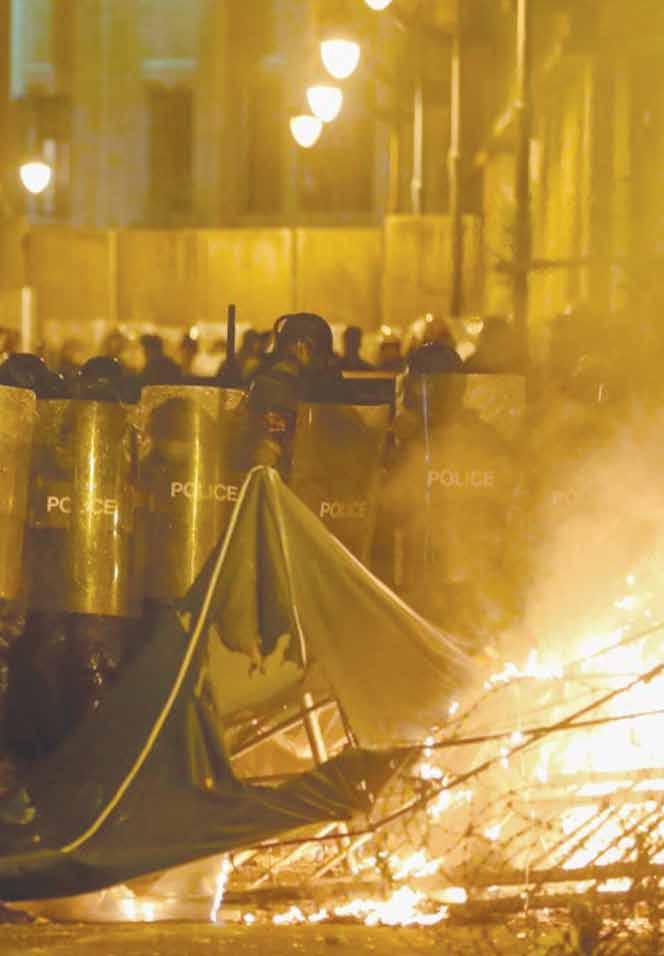
However, this is easier said than done. First, the street protests have become an authority that will be taken very seriously, mainly by the international community. Many officials in the US and Europe have linked their response to the new government by the street response. And cracking down on the street protests have essentially failed for the past four months. The previous government, the Lebanese Army, the Internal Security, and Hezbollah-supported thugs, have all taken turns in scaring the protestors into submission.
However, what all these factions did not realize is that violent tactics and the fear factor does not work with people who have nothing left to lose. The Lebanese people have demonstrated many times before, but they have never lost so much, and the economic situation has never been on the However, if the Lebanese government does not start implementing serious reforms, including those stipulated by CEDRE, no bailout will be offered. And if one looks closely at CEDRE, it is clear that the electricity sector has been prioritized in the list of required reforms, something that this government overlooks in its current ministerial statement.
The indications that this government will fail are many. It will not gain the trust of the street and the international community. In a matter of months, if not days, the financial collapse will become a reality and this government will have to face its failure sooner than it expects. The hopes that PM Hassan Diab has to enter history as the savior of Lebanon, and Hezbollah’s hopes that the international community will bail out Lebanon, will probably be buried not long after the parliament approves the cabinet. It is a government that was stillborn, and it is probably the last trick Hezbollah and its allies have up their sleeves.
Hanin Ghaddar is the Friedmann Visiting Fellow, Washington Institute for Near East Policy
olitics P
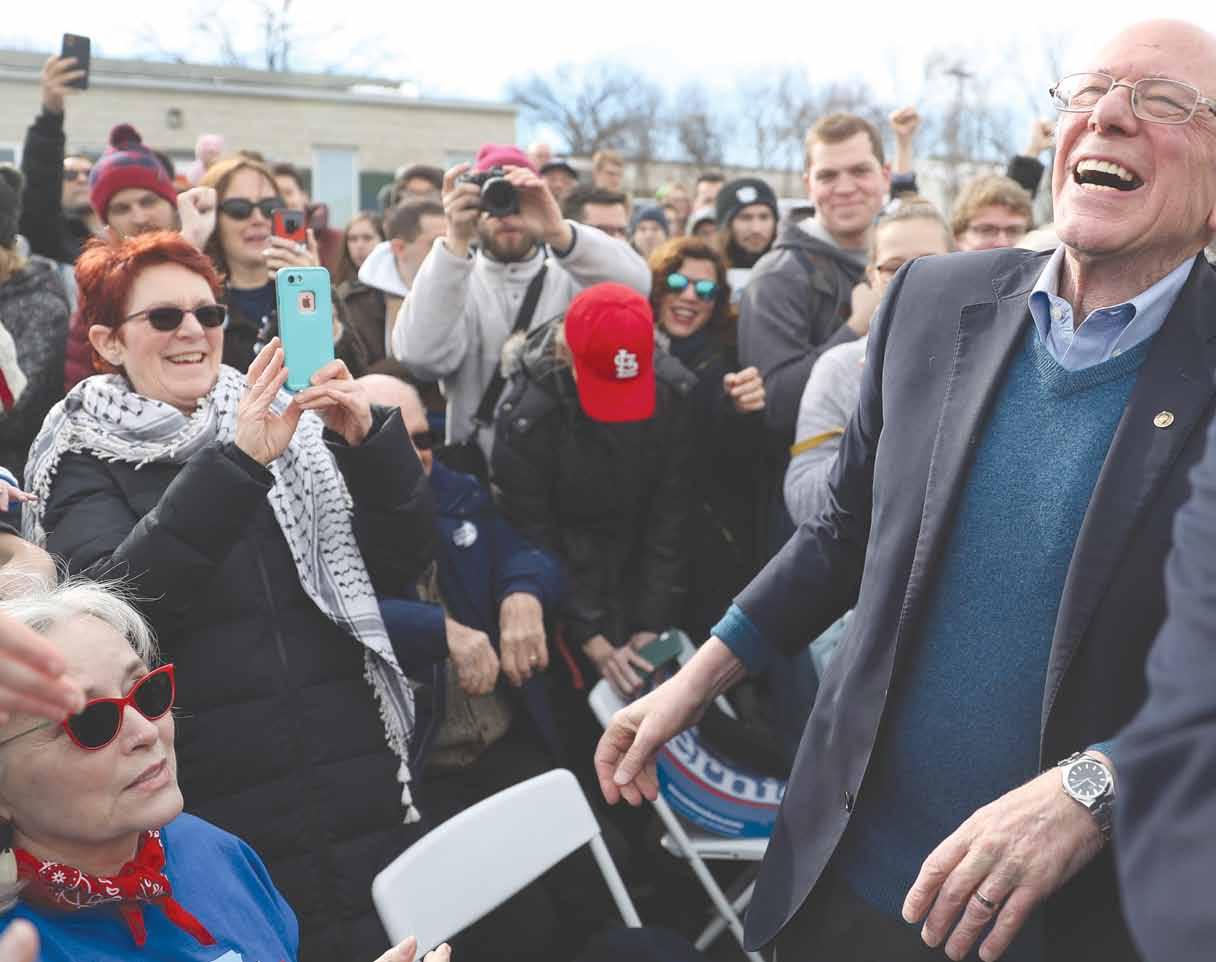
Confusion and Surprise at Iowa›s Democratic Caucus
The Three-Way Split of the Moderate Camp Between Biden, Buttigieg, and Bloomberg is the Greatest Asset to the Sanders Campaign
by Joseph Braude
Despite technical problems delaying the release of the results of Iowa’s caucus vote, field data as of this writing indicates a strong performance for Senator Bernie Sanders and a fracturing of the moderate camp between Vice President Joe Biden and South Bend Mayor Pete Buttigieg. If Sanders should ultimately carry the nomination and the presidency, his foreign policy preferences would
Democratic presidential candidate Sen. Bernie Sanders (I-VT) greets people during a stop at a campaign field office on February 2020 ,02 in Cedar Rapids, Iowa. (Getty)
herald a break with American foreign policy of the Trump administration, and possibly prove more dovish than the Obama administration.
BERNIE SURGES, BIDEN STUMBLES
A comprehensive accounting of the first contest within the Democratic Party will have to wait, due to a “major coding error” in the software being used to tabulate results. Over the 24 hours since the caucus concluded, conflicting results have emerged. One set of field data collected by Senator Sanders’ campaign portends a victory for the Vermont Senator and, more surprisingly, a dismal fourth-place showing for former VicePresident Joe Biden. A slightly fuller but still only partial count by the Iowa Democratic Party shows South Bend mayor Pete Buttigieg holding a slender lead of %26.9 to Sanders’ 25.1 percent. Meanwhile Vice President Biden — previously the leader in national polling — trails in fourth place at 15.6 percent. With Iowa still too close to call, eyes are beginning to turn to the next contest in New Hampshire. There, polling shows Senator Sanders holding a substantial lead over his next closest competitor, Joe Biden. Should Sanders overtake his rivals in both Iowa and New Hampshire — as is eminently possible — it significantly increases the odds that he will secure the Democratic Party’s nomination for President. Famed statistician and political analyst Nate Silver went so far as to calculate that “Iowa was the second most-important date on the calendar this year, trailing only Super Tuesday,” claiming that historical patterns indicate “it [is] worth the equivalent of almost 800 delegates, about 20 times its actual number.”
IMPLICATIONS OF A SANDERS TRIUMPH
A Bernie Sanders nomination raises the possibility of one of the more dovish major-party presidential candidacies in American history. To take one notable example, in January, Sanders unequivocally denounced what he termed “the assassination” of Qods Force commander Qassem Soleimani, saying “Trump’s dangerous escalation brings us closer to another disastrous war in the Middle East that could cost countless lives and trillions more dollars,” and claiming that “Trump promised to end endless wars, but this action puts us on the path to another one.” Sanders has also advocated steep budget cuts to the
U.S. Department of Defense. He observed, “We are now spending more than the next 10 next countries combined — we are spending over 700$ billion a year. At the same time, you have veterans sleeping out on the streets, major crisis after major crisis in affordable housing, infrastructure. I think we have to get our priorities right, and our priorities should include not spending more than the 10 next nations on earth.” Perhaps of even greater salience, given the Presidency’s wide latitude in foreign policy decision-making is Sanders’ pledge to re-enter the Iran nuclear deal “on day one of my presidency and then work with the P1+5 and Iran to build upon it” while negotiating directly with Tehran to “forge a new strategic balance in the Middle East.”
FRACTURING OF THE MODERATE CAMP
Biden’s underperformance in Iowa is significant in several respects. Up to this point, he has led in polling for the more centrist wing of the Democratic party. His apparent fourth-place finish leaves him behind not only the more progressive Sanders and Warren, but upstaged in the centrist column by the youthful Pete Buttigieg. Should Buttigieg lay claim to leadership of the moderate camp, he could siphon off a substantial share of what would otherwise be Biden’s support base. More ominously still for the fortunes of the former Vice President, former New York Mayor Mike Bloomberg has been rising in national polling in recent weeks. Despite his late entrance into the race, Bloomberg has been using his 50$ billion private fortune to finance the largest TV ad campaign in modern primary history. In just under three months, he has spent 132$ million on ads, with much to show for it. Perhaps the greatest asset to the Sanders campaign is the developing three-way split of the moderate camp between Biden, Buttigieg, and Bloomberg.
olitics P
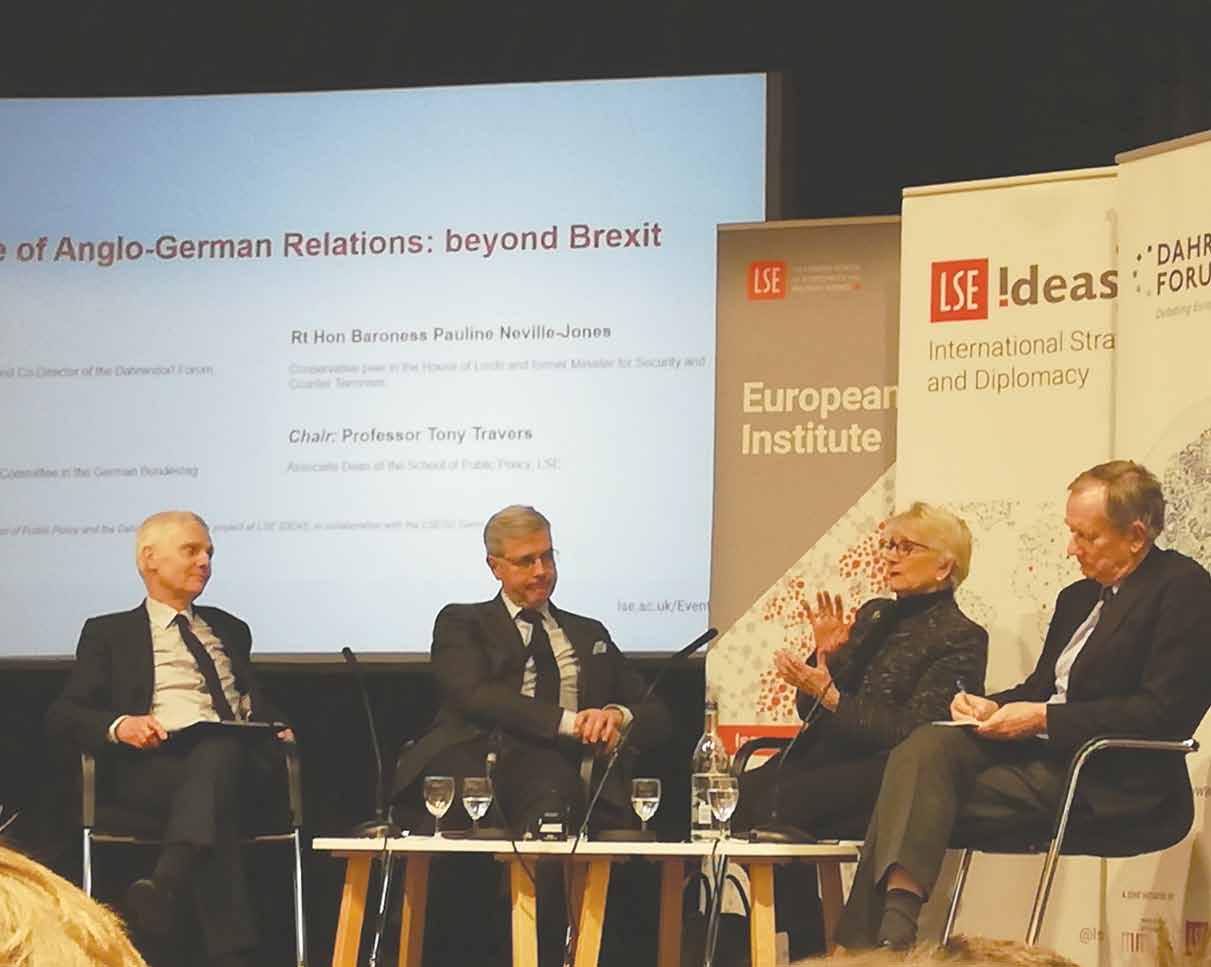
Freundschaft and Brexit
LSE Delves into the Future of Anglo-German Relations After Brexit
by Ali El Shamy
Britain and Germany’s relationship is a bit of a rocky one. While Germany has worked tirelessly to move past its militaristic reputation of the early 20th century, some British politicians have always had a nagging suspicion towards Germany’s rise as a continental leader. Former Prime Minister Margaret Thatcher famously opposed German reunification at the end of the Cold War, viewing the process as a slippery slope that might persuade Germany to go back to its old ways. While Anglo-German relations have moved towards a positive direction during the last 30 years, Brexit has placed many things into question. It’s no secret that some of the more extreme Brexit rhetoric did hark back to the anti-German sentiment which portrayed Berlin as this domineering state that sought to dominate Europe, but this time not through warfare but rather through wider political and economic integration within the EU. Now that Britain has officially left the EU’s institutions, it is time for both nations to rethink their relations and see what can be done moving forward. On February
(L-R) The panel consisting of Professor Tony Travers, Dr. Norbert Röttgen, Baroness Pauline Neville-Jones and Professor Iain Begg.
3, 2020, the prestigious London School of Economics (LSE), hosted a panel discussion that explored the prospect of maintaining Anglo-German relations once Brexit is finalized. The panel consisted of three speakers, Dr. Norbert Röttgen a Christian Democratic Union member of the German Bundestag and Chairman of the German Foreign Affairs Committee, Baroness Pauline Neville-Jones a member of the British House of Lords, and Professor Iain Begg a research fellow at the European Institute and LSE, Professor Tony Travers served as the chair of the panel.
COMING TO TERMS WITH BREXIT
Despite the fact that the result of the referendum has been known for three years, the three speakers, all of whom were anti-Brexit, were still grieving Britain’s exit from the bloc. Dr. Röttgen, in particular, started his talk by stating that he opposed Brexit from the very beginning and he viewed it as contrary to what he considered current geopolitics and the geopolitical revolution that started 5 years ago. He also stated that united foreign policy front that counters the challenges that face continent, particularly the rise of an increasingly repressive Chinese state, and the myriad of Middle Eastern conflicts that might spill over to the Middle East. He would repeat such sentiments again in the middle of the conference, stating that German politicians thought they understood how the British public thought of the EU and they were thus surprised to see how many elements within British society evolved to become increasingly hostile towards the EU. However, he along with the other speakers agreed that it is now time to move on and try to salvage Anglo-German relations.
LOSSES ON BOTH SIDES YEILDING LONG-TERM BENEFITS?
Ever since the referendum, most news outlets reported on the losses that the UK would face once it left the EU, but they seldom talked about what Germany and the EU would lose. Iain Begg stated the fact that Germany is the UK’s second-biggest export market, a fact that made it critical for both sides to find a working economic trade policy. Begg emphasized that fallout in trade negotiations would result in a lose-lose situation for both sides; not only would the UK lose a vital trade partner in Germany, but Berlin could also possibly see one of its largest export markets (London) move towards Washington to fulfill its trading needs.
Baroness Pauline Neville-Jones, one of the most ardent remainer members within the House of Lords, was cautiously optimistic about the benefits Brexit can yield
for Britain, however, the country might not start seeing those benefits for another 10 to 15 years. Barriers such as tariffs would hinder Anglo-German relations in the short-term. However, Baroness Neville-Jones also was also confident that the current technological revolution centered on AI was reason to believe that the high-tech industry may penetrate economic barriers such as tariffs and customs. The prospect of these eventual economic gains does not mean that Britain wouldn’t lose out on other aspects, Baroness Neville-Jones said that the UK might not be effective when it comes to policing and counterterrorism since it would lose organic access to institutions like Europol and the European Arrest Warrant.
BORIS JOHNSON’S BALANCING ACT IN NEGOTIATIONS
The coming 11 months will be a make or break moment for current UK-EU relations. In spite of the nationalistic rhetoric used by the Johnson government, the panel was adamant that it would ultimately take a pragmatic approach to negotiations. Dr. Röttgen said that he always urges his compatriots in Germany not to take a bitter view of Britain, and he much prefers if they view the act of Brexit as part of the wider identity crisis happening within Western countries which has given right-wing populism room to grow and spread. Moreover, he believed that both sides had two clear options, they can either choose to mutually inflict harm on each other or try to do yield the best outcome out of the current circumstances. Röttgen believed that the British government will ultimately choose the more pragmatic approach out of necessity. While all three speakers in the panel were against Brexit, they surprisingly had some words of praise for Boris Johnson. Iain Begg stated that Johnson was able to appease most Brexiters by giving them the big prize of
olitics P
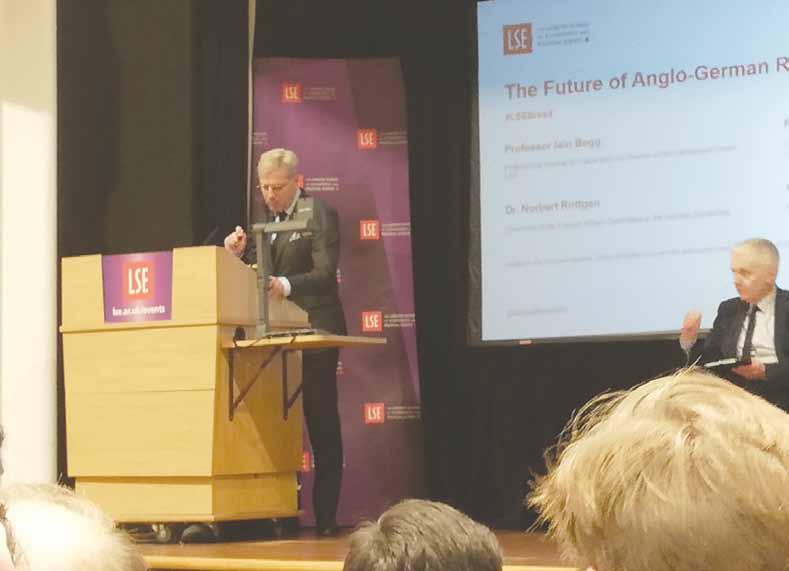
Brexit, this has now given him leg room to ask for a sensible deal from the EU. The speakers further spoke about the importance of language and rhetoric during the coming rounds of negotiations, again something they think Johnson has a clear understanding of. In Röttgen’s view, the rhetoric will create the political reality of either a messy breakup or a divorce built on mutual understanding. Baroness Neville-Jones stated that she did not admire the way the EU handled the first round
Baroness Neville-Jones reminded the audience that the English electorate’s decision to vote in favor of Brexit was based on jingoistic feelings rather than economic reasoning, as such, it is not farfetched that the Scottish electorate could follow suit should they get another independence referendum.
of negotiations back in 2017 when the EU kept emphasizing the rules and procedures of exiting the bloc. Iain Begg, for his part, thought that Theresa May also started off on the wrong foot during the Lancaster House speech when she spoke of the red lines she wouldn’t be flexible on, in a way both parties made negotiations difficult from the start. Röttgen would go on to say that Johnson seemed to have played a balancing act that worked; at home front he displayed tough rhetoric that appealed to hardline Brexiters, meanwhile on the other side he acted pragmatically with the EU and negotiated a deal in a short time period. He did warn, however, that such an approach may not work again in future negotiations.
A UNITED EU AND A DISUNTITED KINGDOM?
My question for the panel had to do with the possibility of Scottish independence and if greater Scottish-EU relations would further isolate England in the continent. Iain Begg said that the fact that a nationalist party is in power in both England and Scotland was a recipe for major political clashes. In fact, if Westminster continues to deny the SNP another independence referendum, the latter might take the case to the supreme court. He did warn that the fact that the SNP hasn’t been doing a stellar job while in power might hinder its goal of persuading voters to choose independence. Furthermore,
18 07/02/20 Bundestag Member Dr. Norbert Röttgen addressing the audience at LSE’s Old Theatre.
House of Lords Member Baroness Pauline Neville-Jones addressing the audience at LSE’s Old Theatre.
economic factors might dissuade voters from voting to leave the UK. For example, the question of what currency to use post-independence would cause a stir, also Scotland’s biggest export market is England, not the EU. These factors make independence economically unsound. Baroness Neville-Jones did refute Begg’s op
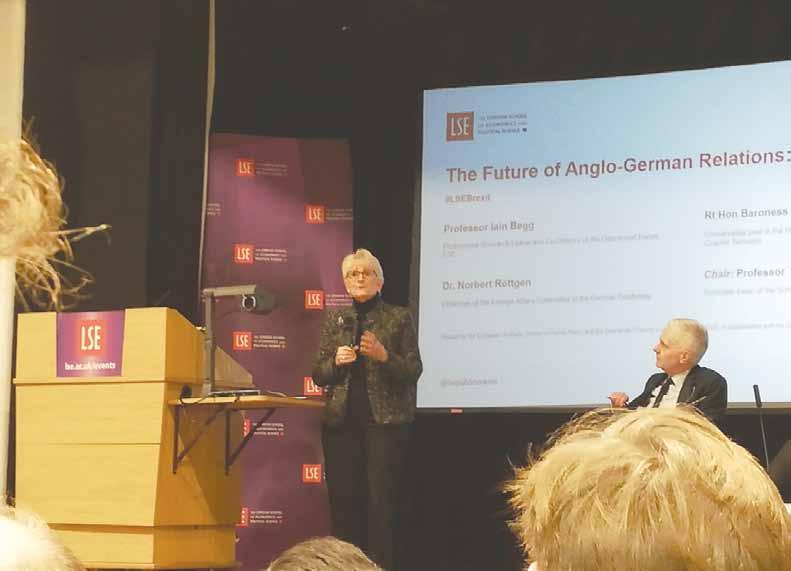
timism though, as she reminded the audience that the English electorate’s decision to vote in favor of Brexit was based on jingoistic feelings rather than economic reasoning, as such, it is not farfetched that the Scottish electorate could follow suit should they get another independence referendum.
German Chancellor Angela Merkel (CDU, R) greets British Prime Minister Boris Johnson as he arrives for an international summit on securing peace in Libya at the German federal Chancellery 2020 ,19on January in Berlin, Germany. Leaders of nations and organizations linked to the current conflict are meeting to discuss measures towards reaching a consensus between the warring sides and ending )hostilities. (Getty
